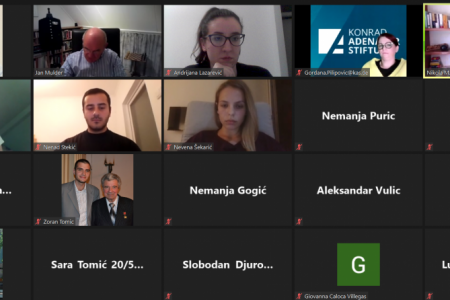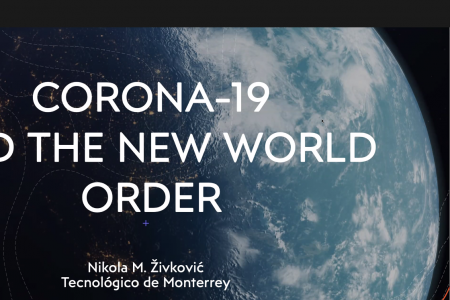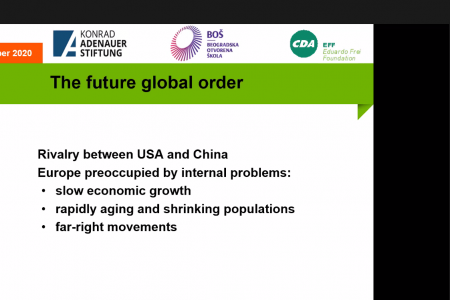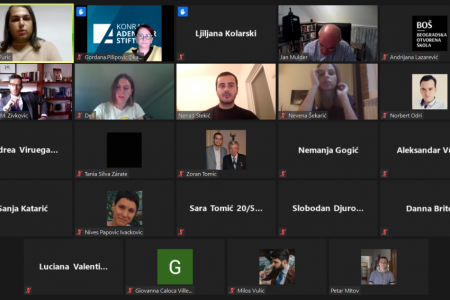PolitiKAS debate: About the new world order in the world of chaos
On Tuesday, November the 3th, the fifth debate on COVID-19 and its impact on the new world order was held. The debate was organized by the Belgrade Open School and the Konrad Adenauer Foundation with the support of the Eduardo Frei Foundation from the Netherlands, as part of the PolitiKAS debate program: New Normality. Speakers at the debate were Jan Mulder, an expert in crisis management, and Nikola Živković, Professor of International Relations at Tecnológico de Monterrey, Faculty of Social Sciences and Government in Mexico. The debate was moderated by Nenad Stekić, a research associate at the Institute for International Politics and Economics.
Global world order - why is it a particularly interesting topic today?
"At least two and a half decades ago, we have been intensively thinking and discussing what kind of world order we live in after the Cold War," Professor Zivkovic began his presentation. "We have not yet come to the naming of the period in which we live, but instead we are adding another prefix to it after, after, after the Cold War. In this context, an issue that particularly attracts the attention of the academia is the issue of continuity and change. So who are the actors who maintain that order or who are the ones who are asking for that order to change? These are the transition periods, which are marked as the most problematic "nightmare" of the period when the transition or change of government takes place. Change happens most easily when there are some disruptions, some challenges for the system itself - such as this moment we are living in now, which is caused by a pandemic. Only then that change become more acceptable to both leaders and other people. The question is whether this change, this transition we are living through now, will lead to a major rift between America and China, in essence. " in general in the world. That hat rivalry was also visible in the decision of the UK to leave the EU. The rivalry between Russia and the West in general can also be noticed. While the world was trying to unite with international trade and digitalization, the Trump administration, which worked under the motto America is in the first place, did the exact opposite."
Jan Mulder referred to the current events and the crisis and pointed out that "every year, the World Forum publishes a report on global risks, and the probability of the danger of outbreaks. The global infections were not on the list at all when it comes to global risks." In less than a year, there have been changes. Suddenly, the hitherto known risks are no longer so threatening, and some new risks are coming in their place. Harvard University concluded that the pandemic was the event that shook the world the most after the Second World War, and that it is the first completely global crisis in human history. The economic costs of that crisis are enormous. ”Mulder added that “COVID-19 has not only had a negative impact on changing economic conditions, but has led authoritarian governments to re-enter the scene. The current pandemic has significantly affected the freedom of citizens in terms of various restrictions. Millions of people lost their jobs. The global economy is already in recession. Developing economies need support. Trade and investment barriers are growing. The world is less and less free and less and less open, and in such a situation, realizing open international trade and encouraging investment is a great challenge. "
Professor Zivkovic pointed out that "during this crisis, we haved used the available mechanisms that were once used in dealing with crises. There is no multilateral crisis management. We still have time to talk until a global summit. "States need to agree on at least some basic crisis management mechanisms, and they need to have headlines that countries should implement."
The world after COVID-19
When it comes to the period after the pandemic, the speakers agreed that there will be a significant rivalry between America and China. Europe will most likely be occupied with internal problems, and that is economic growth, an aging population and the spread of right-wing movements. "As the rivalry between the United States and China grows, Europe will have to decide how to position itself on this issue. COVID-19 has fundamentally changed the lives of citizens. Never before have governments governed people so much. With the exit of America, the World Health Organization lost its influence and initiatives. China is a powerful, but insufficiently experienced leader, as we have seen in this crisis. The EU is based on a multilateral world, trust, solidarity and the capacity of countries to sit down with others and negotiate complicated matters. EU leaders must stop functioning in the mental set of the Cold War, when others solved the burning crises instead of them" the speakers agreed.
During the debate, Professor Živković spoke about three possible scenarios after the COVID-19 scenario:
- Change that is already happening - even before the crisis we saw the decline of rights-based mechanisms, we saw the instrumentalization of that multilateral system. The pandemic only caused weaknesses in this system and led to a crackdown. It is a profound change in the system, and the impression is that now, instead of the rights, the emphasis will be on force. If the EU does not implement the reform, it can only be part of the game between America and Russia.
- The second thing is that the way forward is the way of true reform - the current situation has shown us what is happening in the absence of global governments and some framework of global cooperation. So, if we want to move forward, we must break with nationalist tendencies and isolationism. Only a united state can take on the fight against global challenges, and that requires a genuine reform of the global political system.
- The third scenario implies that "we can't wait for everything to return to the old, normal". People are not ready to accept big changes, because they imply the need for reforms that are again difficult to accept. Therefore, we cannot go for some modification, an adaptation that will actually be functional until some new crises that may be even more dangerous.
Jan Mulder's conclusion was that "the current pandemic will not significantly change the nature of world politics." Nation-states will remain the basis of international relations. Nationalism remains a very strong political driver, and the great powers will continue to be in competitive relations. Global institutions, transnational networks and non-state actors will continue to play a significant role. The pandemic and crisis are likely to accelerate trends leading away from the process of globalization. Non-democratic governments will strengthen, and relations between the great powers will continue to develop. All of the above leads to the conclusion that the world after the COVID-19 disease will be less open, less free, less prosperous than the world before the pandemic. " Professor Zivkovic added that "we could successfully fight crises, but we lack strong leaders who will take the responsibility for the decisions they make especially in such crisis situations" and concluded another extremely interesting and interactive PolitiKAS debate.
For more information on upcoming debates, follow our site.
Tel: 381 11 3065 800
E-mail: politikas@bos.rs
Bulevar oslobodjenja 177
11000 Belgrade




